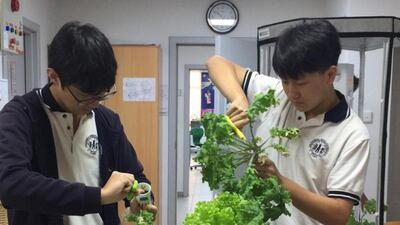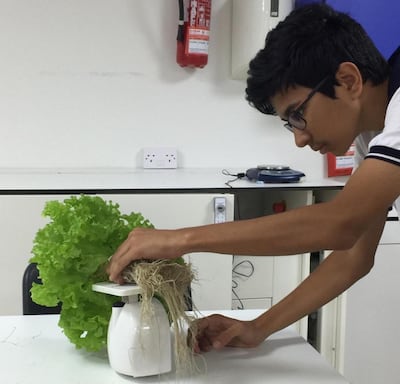School pupils in the UAE will be taught how to farm and calculate their carbon footprint under a new sustainability scheme led by an agricultural technology firm.
The initiative, launched by Madar Farms, aims to ensure younger generations are conscious of the environment and their own impact on the planet.
Children will be able to farm and grow vegetables at their schools or at the Madar Farms facility in Masdar City, Abu Dhabi.
The programme, targeting children aged between 11 and 16, will also educate pupils on food nutrition in a bid to reduce childhood obesity in the country.
Abdulaziz AlMulla, chief executive of Madar Farms, said he believes the programme will fill a gap in the sustainability education market in the UAE.
"One of the most important things is building awareness. When you ask children 'where does food come from?' their answer is usually 'a supermarket'" said Mr AlMulla.
"As children learn about food and how to grow it, they would also learn about how their habits at home have impacted the planet."
The "Sustainable Futures" initiative has been piloted at five private schools, but registrations have now been opened to schools across the country.
Schools will have to pay Dh25,000 to Dh30,000 to use the programme for a year.
Pupils are provided with a tool, customised to the UAE, through which they can calculate their carbon footprint.
To calculate this, children would be asked if they finish their meal and what percentage of their meal they waste, or how much time take they take for a shower every morning.
Though they may not get an exact result of their carbon footprint, the tool would give children an understanding of their impact.
"It surprises people when they realise how much their activities impact the environment," said Mr AlMulla.
Children would be engaged through activities. For example, a child may watch the story of a girl named Maryam who follows the journey of a tomato from Holland where it is grown, making its way to the UAE.
"We have seen children build small businesses in schools as we saw children started making salads and selling these," said Mr AlMulla.
Some private schools in Dubai have already launched sustainability initiatives to educate pupils.
New schools in the emirate have encouraged children to grow their own food. The Aquila School has a desert gardening programme where children are educated in food technology. The school has a 1,500 square metre indoor organic garden powered by solar energy and using recycled water.
Dunecrest American School also has living walls and tower gardens where pupils grow food and herbs.
“Following our successful pilot project at selected private schools in the UAE, we are excited to launch our ‘Sustainable Futures’ program for September," said Tatiana Shahir, head of education at Madar Farms.
“By providing the opportunity for pupils to engage through activities and get a better understanding of the importance of sustainability, ‘Sustainable Futures’ can also empower the leaders of tomorrow with the awareness, knowledge, skills, and opportunities to create a sustainable future for us all."



